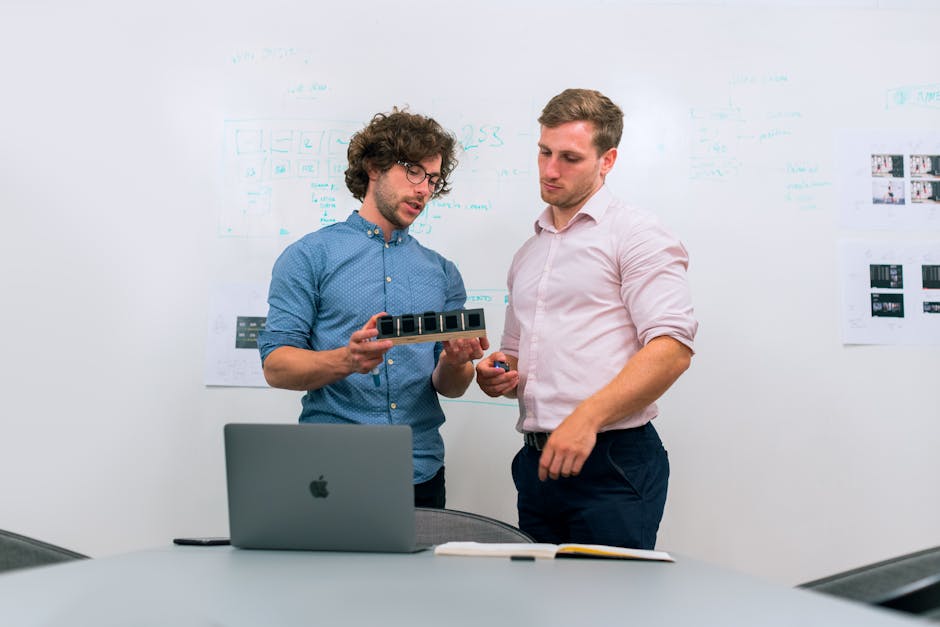The Growing Influence Of Mvp Development In Leeds’ Start-up Ecosystem
Leeds’ start-up ecosystem is experiencing a surge in the influence of MVP (Minimum Viable Product) development. This process, with its proven benefits, is revolutionising the way start-ups in Leeds bring their ideas to life.
By following this approach, entrepreneurs are able to validate their concepts and attract investors more effectively. But it doesn’t stop there – MVP development also enables start-ups to gather valuable user feedback for iterative improvement, ensuring that their products meet market demands.
One of the most significant advantages of this method is its cost-effectiveness. Start-ups can save time and resources by focussing on building a basic version of their product, allowing them to allocate funds strategically as they scale up.
As a result, the start-up landscape in Leeds is rapidly evolving as more and more entrepreneurs embrace MVP development. Success stories are emerging from various industries within the ecosystem, showcasing how this approach has propelled these start-ups towards growth and success.
In this article, we will explore the growing influence of MVP development in Leeds’ start-up scene and delve into some inspiring success stories that have shaped the city’s entrepreneurial landscape.
Key Takeaways
- MVP development revolutionises the way start-ups in Leeds bring their ideas to life.
- MVP development helps start-ups validate their concepts and attract investors more effectively.
- Start-ups can gather valuable user feedback for iterative improvement through MVP development.
- MVP development is cost-effective and allows start-ups to allocate funds strategically as they scale up.
Benefits of MVP Development for Start-ups

You’ll be amazed at the benefits MVP development can bring to your start-up, giving you a quick and cost-effective way to test your idea and gain valuable user feedback.
Customer acquisition is an essential aspect of any start-up’s growth, and MVP development provides a strategic approach to attracting customers. By creating a minimum viable product, you can gauge customer interest and adapt accordingly before investing significant time and resources into building a fully-fledged product.
MVP development also plays a crucial role in market validation. Before launching a new product or service, it is essential to ensure that there is sufficient demand in the market. With an MVP, you can test your idea amongst potential customers and gather their feedback early on. This helps validate your concept, identify any gaps or shortcomings, and make necessary improvements before scaling up.
One of the main advantages of MVP development is its cost-effectiveness. By focussing on developing only the core features required for initial testing, you can significantly reduce development costs compared to building a complete product from scratch. This allows start-ups with limited resources to experiment with different ideas without risking substantial financial investments.
Furthermore, an MVP enables start-ups to attract investors more effectively. When seeking funding for your venture, having tangible evidence of customer interest through an MVP demonstrates that you have thoroughly thought through your idea and have taken steps towards validating it in the market. Investors are more likely to invest in start-ups that have proven their concept’s viability through real-world testing.
By leveraging the power of MVP development for your start-up, you can efficiently validate ideas while attracting potential investors looking for promising ventures. Transitioning into the subsequent section about validating ideas and attracting investors becomes seamless as these two aspects go hand-in-hand in driving start-up success without compromising resources unnecessarily.
Validating Ideas and Attracting Investors

Discovering the right approach to validate ideas and attract investors can be a game-changer for your venture. One effective strategy is to conduct thorough market research to understand your target audience’s needs and preferences. By gaining insights into the market demand, you can tailor your product or service to meet those specific requirements. This not only increases the chances of success but also demonstrates to potential investors that you have a solid understanding of the market dynamics.
Another crucial aspect of validating ideas and attracting investors is developing a minimum viable product (MVP). An MVP allows you to test your concept in the real world with minimal resources. It enables you to gather valuable feedback from early adopters, which can help refine your offering before investing significant time and capital into its development.
To better visualise this process, consider the following table:
| Market Research | Minimum Viable Product |
|---|---|
| Identify target audience | Develop a basic prototype |
| Analyse customer needs | Test it with early adopters |
| Study competitors’ offerings | Collect feedback for iterative improvement |
By incorporating both market research and an MVP approach, start-ups in Leeds are able to validate their ideas effectively while simultaneously attracting potential investors. The combination of these strategies showcases a data-driven decision-making process that minimises risks and maximises opportunities for success.
As you move forward in your journey, gathering user feedback for iterative improvement becomes essential. It allows you to iterate on your MVP based on real-world usage and user input, ensuring that every step taken brings you closer to meeting customer demands.
Gathering User Feedback for Iterative Improvement

As you continue on your entrepreneurial journey, gathering user feedback for iterative improvement is like adding fuel to the fire of innovation, igniting new ideas and propelling your venture forward. User engagement is crucial in understanding the needs and preferences of your target audience. By actively seeking feedback from users, you can gain valuable insights that will guide continuous improvement of your Minimum Viable Product (MVP).
A key benefit of gathering user feedback is the emotional connexion it creates with your audience. When users feel heard and valued, they become more invested in the success of your product. This emotional bond fosters loyalty and encourages them to provide honest and constructive feedback, enabling you to make informed decisions about future iterations.
Additionally, receiving user feedback helps uncover potential pain points or areas for improvement that may have been overlooked during initial development stages. This allows you to address these issues promptly and refine your product accordingly. Continuous improvement based on user input ensures that your MVP evolves in line with changing market demands, enhancing its competitiveness.
On another note, gathering user feedback also serves as a source of inspiration for new features or enhancements. Through active engagement with users, you can identify innovative ideas that aline with their needs and desires. By incorporating these suggestions into subsequent iterations of your MVP, you not only improve the overall experience but also demonstrate responsiveness to customer input.
By continuously gathering user feedback for iterative improvement, you are able to fine-tune your MVP based on real-world usage patterns and preferences. This approach lays a solid foundation for a cost-effective approach to product development by minimising wasted resources on unnecessary features or functionalities.
In the next section, we will explore how this lean methodology contributes to a streamlined development process without compromising quality or innovation.
Cost-Effective Approach to Product Development

Embarking on your entrepreneurial journey and navigating the world of product development is like embarking on a treasure hunt, where finding cost-effective approaches to building your product becomes the key to unlocking success. In today’s competitive start-up landscape, it’s crucial to adopt strategies that optimise resources while still delivering a high-quality product.
This is where Agile methodology and Lean start-up principles come into play. Agile methodology is an iterative approach that focuses on flexibility and adaptability. It emphasises collaboration between cross-functional teams and allows for continuous improvement throughout the development process. By breaking down the project into smaller tasks or user stories, entrepreneurs can prioritise features based on customer feedback and allocate resources effectively.
In parallel, the Lean start-up philosophy advocates for a minimum viable product (MVP) approach. Instead of investing significant time and money in developing a fully-featured product from the start, entrepreneurs create a basic version with core functionalities. This MVP is then tested with real users who provide valuable feedback for further refinement. This lean approach not only saves costs but also accelerates time-to-market by quickly validating assumptions and identifying potential pitfalls.
By combining Agile methodology with Lean start-up principles, start-ups in Leeds can achieve cost-effective product development without compromising quality. These approaches enable entrepreneurs to leverage customer insights early in the process, reducing the risk of building something that doesn’t meet market needs.
As we delve deeper into shaping the start-up landscape in Leeds, let’s explore how these methodologies have contributed to fostering innovation and driving growth in this vibrant ecosystem.
Shaping the Start-up Landscape in Leeds

You can see a thriving start-up landscape in Leeds, with innovative ideas and vibrant businesses shaping the entrepreneurial scene. The city has become a hub for start-ups, attracting entrepreneurs from all over the country.
One of the factors contributing to this growth is the presence of start-up accelerators in Leeds. These organisations provide valuable resources and support to early-stage start-ups, helping them to develop their products and scale their businesses more quickly. Start-up accelerators offer mentorship programmes, access to funding opportunities, and networking events that allow entrepreneurs to connect with industry experts and potential investors. This ecosystem of support creates an environment conducive to innovation and growth.
Local government initiatives have also played a significant role in shaping the start-up landscape in Leeds. The government has recognised the importance of supporting start-ups as drivers of economic growth and job creation. Through policies such as tax incentives, grants, and infrastructure development, the local government has created an environment that attracts entrepreneurs and encourages them to start their businesses in Leeds.
The combination of start-up accelerators and local government initiatives has fostered a culture of entrepreneurship in Leeds. Start-ups are flourishing, creating new jobs and driving economic activity in the city. As a result, success stories of MVPs (Minimum Viable Products) have emerged from the Leeds start-up ecosystem. These stories demonstrate how MVP development has helped start-ups validate their ideas quickly, gain market feedback, and iterate on their product offerings to achieve success.
Transitioning into the subsequent section about ‘success stories of MVPs in the Leeds start-up ecosystem’, it is clear that MVP development has been instrumental in driving innovation and growth amongst start-ups in Leeds without taking unnecessary risks or investing large amounts upfront.
Success Stories of MVPs in the Leeds Start-up Ecosystem

Imagine stepping into a vibrant garden of blooming flowers, where budding start-ups in Leeds have blossomed into success stories with their Minimum Viable Products (MVPs) acting as the seeds of innovation.
These MVPs have played a crucial role in shaping the start-up ecosystem in Leeds, providing entrepreneurs with a foundation to build upon and creating a culture of entrepreneurial support.
One key factor contributing to the success of MVPs in Leeds is the strong network of support available to start-ups. From mentorship programmes to incubators and accelerators, entrepreneurs are able to access guidance and resources that help them refine their MVPs and navigate the challenges of market competition. This support system not only provides start-ups with valuable feedback but also helps them connect with potential investors, partners, and customers.
In addition to entrepreneurial support, market competition has also been instrumental in driving the growth of MVPs in Leeds. Start-ups operating within a competitive market are forced to iterate quickly and deliver value to customers from day one. By launching an MVP early on, start-ups can test their assumptions, gather customer feedback, and make informed decisions about product development. This iterative approach allows start-ups to adapt rapidly to changing market dynamics and gain a competitive edge.
The success stories emerging from the Leeds start-up ecosystem serve as inspiration for aspiring entrepreneurs looking to bring their own ideas to life. Through the use of MVPs, these start-ups have been able to validate their business models, attract investment, and scale their operations. As more entrepreneurs embrace this lean start-up methodology, we can expect further growth and innovation within the vibrant start-up scene in Leeds.
Contact us to discuss our services now!
